Top Rankings
Provo School District ranks among the top 20% of public school district in Utah for:
Category
Attribute
Diversity
Most diverse schools (Top 1%)
Community Size
Largest student body (number of students) (Top 1%)
For the 2025 school year, there are 6 public high schools serving 4,635 students in Provo School District. This district's average high testing ranking is 7/10, which is in the top 50% of public high schools in Utah.
Public High Schools in Provo School District have an average math proficiency score of 28% (versus the Utah public high school average of 34%), and reading proficiency score of 54% (versus the 44% statewide average).
Public High School in Provo School District have a Graduation Rate of 91%, which is more than the Utah average of 88%.
The school with highest graduation rate is Timpview High School, with 94% graduation rate. Read more about public school graduation rate statistics in Utah or national school graduation rate statistics.
Minority enrollment is 43% of the student body (majority Hispanic), which is more than the Utah public high school average of 29% (majority Hispanic).
Overview
This School District
This State (UT)
# Schools
22 Schools
357 Schools
# Students
13,887 Students
304,700 Students
# Teachers
668 Teachers
13,717 Teachers
Student : Teacher Ratio
21:1
21:1
District Rank
Provo School District, which is ranked within the top 50% of all 153 school districts in Utah (based off of combined math and reading proficiency testing data) for the 2020-2021 school year.
The school district's graduation rate of 91% has increased from 73% over five school years.
Overall District Rank
#53 out of 154 school districts
(Top 50%)
(Top 50%)
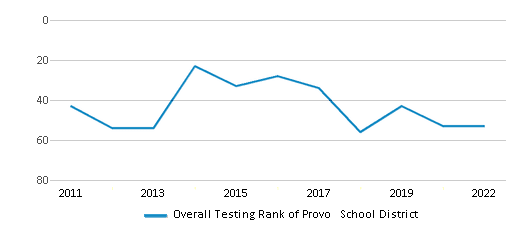
Math Test Scores (% Proficient)
(20-21)38%
39%
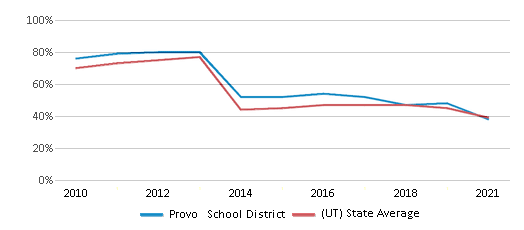
Reading/Language Arts Test Scores (% Proficient)
(20-21)46%
43%
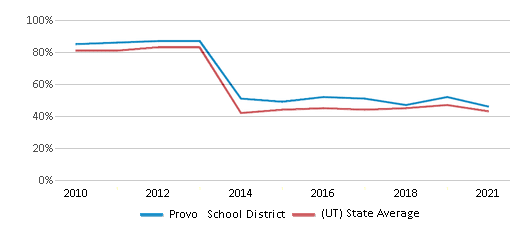
Science Test Scores (% Proficient)
(20-21)44%
45%
Graduation Rate
91%
88%
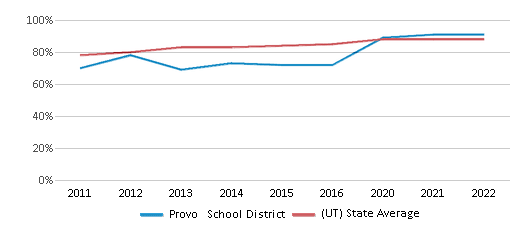
Students by Ethnicity:
Diversity Score
0.58
0.45
# American Indian Students
105 Students
2,617 Students
% American Indian Students
1%
1%
# Asian Students
231 Students
5,001 Students
% Asian Students
2%
2%
# Hispanic Students
4,507 Students
59,783 Students
% Hispanic Students
32%
20%
# Black Students
146 Students
4,038 Students
% Black Students
1%
1%
# White Students
7,808 Students
217,573 Students
% White Students
56%
71%
# Hawaiian Students
420 Students
4,429 Students
% Hawaiian Students
3%
1%
# Two or more races Students
666 Students
11,163 Students
% of Two or more races Students
5%
4%
Students by Grade:
# Students in PK Grade:
420
458
# Students in K Grade:
969
3,590
# Students in 1st Grade:
965
3,628
# Students in 2nd Grade:
998
3,655
# Students in 3rd Grade:
981
3,723
# Students in 4th Grade:
1,004
3,717
# Students in 5th Grade:
1,006
3,667
# Students in 6th Grade:
951
4,950
# Students in 7th Grade:
1,023
27,723
# Students in 8th Grade:
1,002
34,647
# Students in 9th Grade:
1,094
53,806
# Students in 10th Grade:
1,169
55,206
# Students in 11th Grade:
1,204
54,320
# Students in 12th Grade:
1,101
51,610
# Ungraded Students:
-
-
District Revenue and Spending
The revenue/student of $12,518 is higher than the state median of $10,732. The school district revenue/student has stayed relatively flat over four school years.
The school district's spending/student of $11,405 is higher than the state median of $10,829. The school district spending/student has stayed relatively flat over four school years.
Total Revenue
$174 MM
$7,309 MM
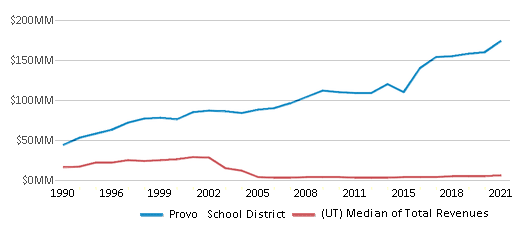
Spending
$158 MM
$7,375 MM
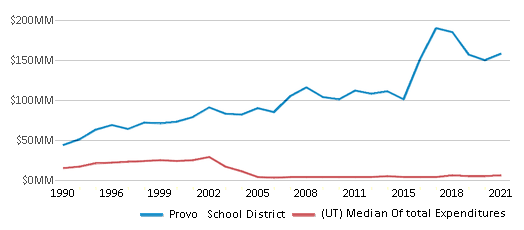
Revenue / Student
$12,518
$10,732
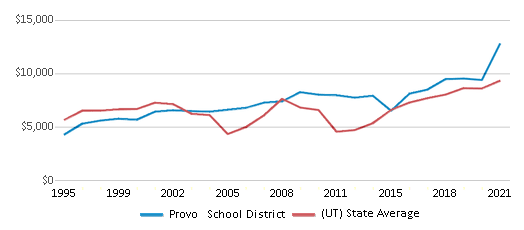
Spending / Student
$11,405
$10,829
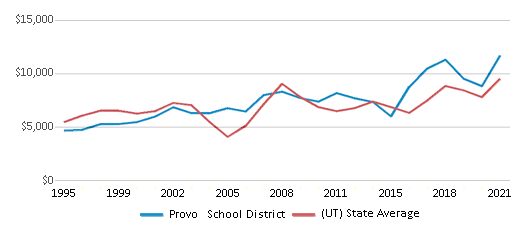
Best Provo School District Public High Schools (2025)
School
(Math and Reading Proficiency)
(Math and Reading Proficiency)
Location
Grades
Students
Rank: #11.
Timpview High School
(Math: 35% | Reading: 61%)
Rank:
Rank:
7/
Top 50%10
3570 N 650 E
Provo, UT 84604
(801) 221-9720
Provo, UT 84604
(801) 221-9720
Grades: 9-12
| 2,268 students
Rank: #22.
Provo Eschool
(Math: 35-39% | Reading: 55-59%)
Rank:
Rank:
7/
Top 50%10
280 W 940 N
Provo, UT 84604
(801) 374-4814
Provo, UT 84604
(801) 374-4814
Grades: K-12
| 53 students
Rank: #33.
Provo High School
(Math: 18% | Reading: 47%)
Rank:
Rank:
4/
Bottom 50%10
1199 North Lakeshore Dr
Provo, UT 84601
(801) 373-6550
Provo, UT 84601
(801) 373-6550
Grades: 7-12
| 1,981 students
Rank: #44.
Independence High School
Alternative School
(Math: ≤20% | Reading: ≤20%)
Rank:
Rank:
1/
Bottom 50%10
636 N Independence Ave
Provo, UT 84601
(801) 374-4920
Provo, UT 84601
(801) 374-4920
Grades: 5-12
| 278 students
Rank: n/an/a
Provo Adult Education
Alternative School
636 N Independence Ave
Provo, UT 84601
(801) 374-4840
Provo, UT 84601
(801) 374-4840
Grades: 9-12
| n/a students
Rank: n/an/a
Slate Mountain School
Alternative School
1991 South State Street
Provo, UT 84606
(801) 342-7840
Provo, UT 84606
(801) 342-7840
Grades: K-12
| 55 students
Recent Articles

What Is A Charter School?
Explore the world of charter schools in this comprehensive guide. Learn about their history, how they operate, and the pros and cons of this educational innovation. Discover key facts about charter schools, including admission policies, demographics, and funding, as well as what to look for when considering a charter school for your child.

10 Reasons Why High School Sports Benefit Students
Discover the 10 compelling reasons why high school sports are beneficial for students. This comprehensive article explores how athletics enhance academic performance, foster personal growth, and develop crucial life skills. From improved fitness and time management to leadership development and community representation, learn why participating in high school sports can be a game-changer for students' overall success and well-being.

February 05, 2025
Understanding the U.S. Department of Education: Structure, Impact, and EvolutionWe explore how the Department of Education shapes American education, from its cabinet-level leadership to its impact on millions of students, written for general audiences seeking clarity on this vital institution.





